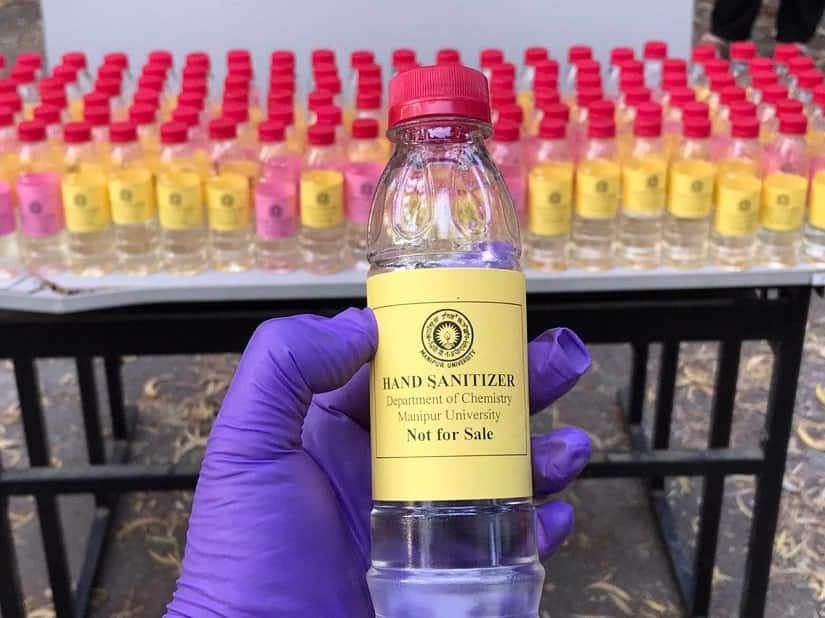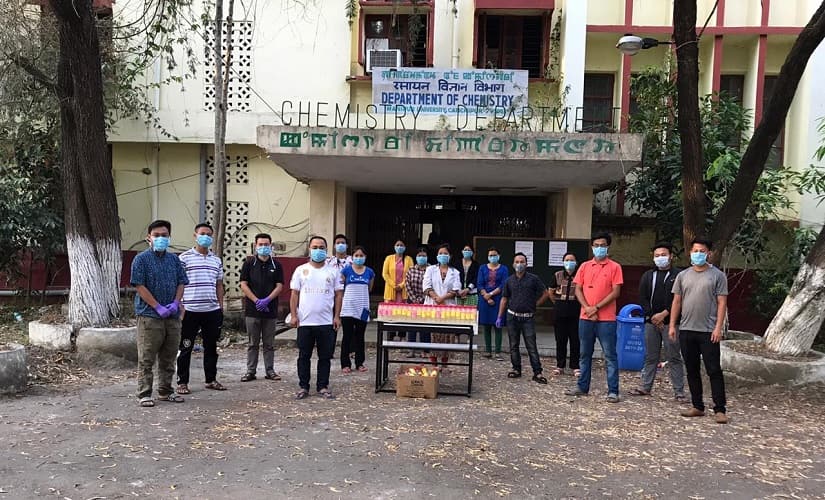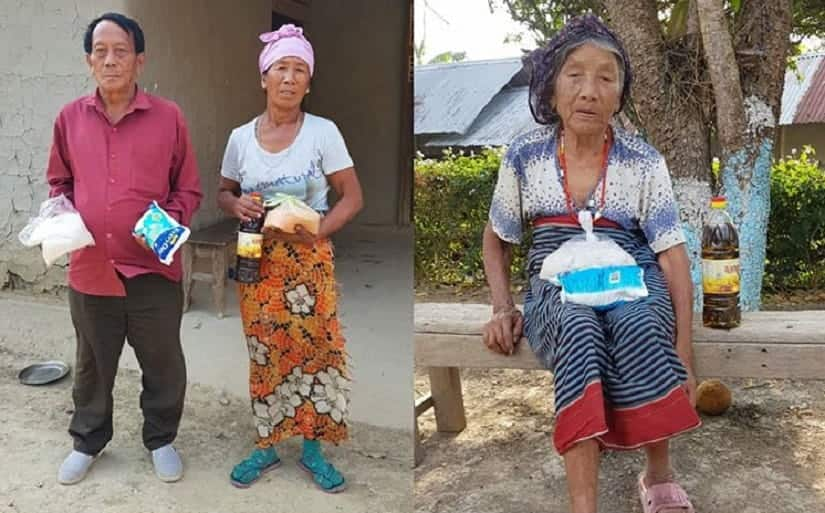Days after Manipur was declared coronavirus-free, Dr Moirangthem Phalguni Singh looked back on the weeks preceding the announcement. An assistant professor of Chemistry at Oriental College, Imphal, Singh is part of an institutional team that produced over 150 units of hand sanitiser in their departmental lab. Overlooking his own contribution to relief efforts, he declared the “impeccable intra-state coordination” as one of the major factors which catalysed the prevention of transmission of the deadly virus, he rejoiced over the phone. “As a teacher of Chemistry, I was anxious about not being able to do anything to control the pandemic at an individual level. But soon, our staff was given an opportunity by the Directorate Of University & Higher Education to prepare alcohol-based hand sanitiser according to the guidelines recommended by World Health Organisation (WHO).” As soon as the first case of COVID-19 was reported from the state of Manipur, officials such as Dr Singh sprang into action, taking stock of the availability of hand sanitisers, known to be an effective way to keep the novel coronavirus at bay. While the state reported only two cases , an indefinite curfew and lockdown was imposed. As a result, logistical hiccups began to impact the supply chains while people scrambled to local stores to keep up with the crunch. [caption id=“attachment_8340301” align=“alignnone” width=“825”]  The sale of hand sanitisers has been growing by more than 100% in India due to the coronavirus scare.[/caption] A relatively small team comprising six staff members, Singh’s department was able to send batches of sanitiser to several local clubs and village councils for further distribution. “We wanted to continue production, but started facing financial difficulties as absolute alcohol [a necessary chemical component] is expensive. Therefore, the production had to be halted after a while.” In another part of Imphal, three research scholars from Manipur University — Atom Rajiv Singh, Kshetrimayum Sangeeta Devi and Sanasam Sachika Devi — approached the head of the chemistry department with a locally-made sample of hand sanitiser. As the three began producing small batches for university administration, the news of this group travelled to the office of chief minister N Biren Singh via Facebook. Soon after, he implored the students to begin mass-production and provided financial assistance for the procurement of additional raw materials. Roughly a month later, what began as a student-led initiative has become a simple yet compelling welfare model focused on recognising and subsequently aiding the most vulnerable communities in the state. [caption id=“attachment_8340401” align=“alignnone” width=“825”]  The Department of Chemistry at Manipur University has dispatched over 22000 bottles of hand sanitiser.[/caption] “We have a target of making at least 50 litres of herbal sanitiser per day, and have so far been able to dispatch approximately 22,000 units to those working on the frontlines,” reveals Atom Rajiv. Now a manufacturing workforce comprising eighteen members, the group has successfully dispatched 22,000 bottles of hand sanitiser to multiple educational and banking institutions, hospitals, media organisations and local corporations across the state. Like their contemporaries, the supervisors at Manipur University have also identified Manipur’s collective ability to engage in rehabilitation as an effective tool to counter the social and economic bottlenecks, observed in societies all over. “Community engagement and togetherness play an important in overcoming any pandemic. We need to make sure that no one is battling this crisis alone. Therefore, the distribution of essential items to needy families has to be done more often,” added Professor N Rajen Singh, who is overseeing the project along with Professor Okram Mukherjee. Following suit, the students and faculty at Imphal’s DM Community College also distributed over a 100 units of hand-rub sanitiser among police personnel, domestic airport staff as well as journalists stationed in different parts of the city. M Birjit Singh, a radiographer at the institute, insisted that following lockdown protocol and ensuring the safety of essential workers is one way to fight the disease which has claimed over 1,700 lives in India. Apart from educational institutes, local NGOs have also responded with schemes aimed to aid students stranded outside Manipur. Ya All, a well-known queer and youth-led network in Imphal, has helped over 2,097 families in 11 districts. Its 130 volunteers have been able to transfer money to about 219 cash-strapped Manipuri students. Additionally, as many as 400 transgender individuals, migrant workers and daily wagers have received ration, sanitary pads and hygiene kits and contraceptives, financed from the NGOs crowdfunding campaigns, said Sadam Hanjabam, founder of the organisation. [caption id=“attachment_8340281” align=“alignnone” width=“825”]  Ya All volunteers reach Nongmeibung in Imphal East with essential goods.[/caption] “Even though in the last week of March the government introduced a website to help stranded citizens, the actual work commenced only around mid-April. In fact, the website became unresponsive days after its launch. So when we opened our helpline, we received calls from Manipuri students, spread across 10 states,” he revealed. Moreover, the increasing cases of racial discrimination against northeasterners, have pushed networks such as Ya All into overdrive. “There is uncertainty and fear of running out of essential products, and then there is the trauma of living in a space that threatens your physical and mental well-being. The latter has not been taken seriously by the authorities yet.” While the state government has gradually begun to lift restrictions on movement, it is yet to bring back the 50,000 Manipuris staying or working in other states, labourers included. However, according to Hanjabam, the estimate might be low, if one were to account for those with limited access to state helplines. “While people from nearby cities like Guwahati and Dimapur are being ferried by bus, it is still uncertain when those in distant places would be brought back. What we do know is that for a state with a population of about 27 lakhs, this crisis has been a revelation.” [caption id=“attachment_8340291” align=“alignnone” width=“825”]  Ya All reaches out to the seniors of Mapao Zingtun, Kangpokpi district, Manipur.[/caption] It is the 36th day of community service for the volunteers at Ya All, while Atom Rajiv along with 17 other students have crossed a month of producing hand sanitiser. Although the coronavirus crisis has posed varied challenges for different communities, Manipur certainly offers significant takeaways useful in the achievement of long term development goals.
Although the coronavirus crisis has posed varied challenges for different communities, Manipur certainly offers significant takeaways that could be useful in the achievement of long term development goals.
Advertisement
End of Article


)

)
)
)
)
)
)
)
)



